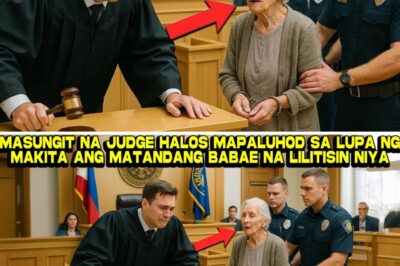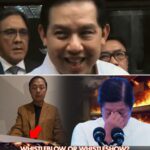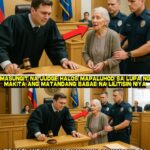
In a brazen and deeply troubling inversion of justice, the very individuals who have courageously stepped forward to expose one of the most significant corruption scandals in recent memory are now finding themselves in the crosshairs of the legal system. The case of Congressman Kiko Barsaga, a young lawmaker who utilized social media to shed light on a multi-billion peso flood control scandal, has become a chilling testament to a system that seemingly prioritizes the protection of the powerful over the pursuit of truth. While the architects of the alleged plunder remain shielded from accountability, Barsaga is now fighting charges of “inciting to sedition”—a move critics are calling a blatant attempt to silence dissent and intimidate anyone who dares to challenge the status quo.
This alarming development is unfolding against a backdrop of political diversions and allegations of witness tampering at the highest levels, painting a grim picture of a nation grappling with a crisis of accountability. The core of the issue lies in the massive flood control project scandal, a complex web of alleged ghost projects and illicit payoffs that has reportedly funneled billions of pesos away from public coffers and into the pockets of high-ranking officials. Congressman Barsaga, a “millennial congressman” from Cavite, became a prominent figure in this fight by leveraging his platform to meticulously expose the anomalies he uncovered. His relentless social media posts and public declarations named powerful figures, including allegations pointing toward Speaker Martin Romualdez as a key figure in the anomalous scheme.
Instead of earning commendation for his actions as a whistleblower, Barsaga has been met with the full force of the state. The Philippine Coast Guard (PCG), an agency he had also criticized, filed the sedition complaint against him. This has sparked widespread public outrage, with many questioning how a lawmaker exercising his freedom of expression to expose corruption can be accused of attempting to overthrow the government. Critics argue that this is a classic case of shooting the messenger, a calculated move to neutralize the threat he poses and send a terrifying message to other potential whistleblowers: if you speak out, you will be the one who pays the price.
The irony is staggering. As Barsaga, who has not been accused of taking a single centavo, faces the legal fight of his life, the “masterminds” of the billion-peso scandal continue to operate with impunity. The public is left to watch as those who allegedly built mansions and amassed fortunes from stolen funds are not only free but are seemingly protected by the very system that is now persecuting their accuser. The video’s narrator poignantly highlights this disparity: speak out against the government and you face charges, but steal billions from the people, and you remain untouched.
The efforts to suppress the truth do not end with Barsaga. In a parallel and equally sinister development, Senator Imee Marcos has made explosive claims that witnesses in the Senate’s flood control investigation are being systematically silenced. According to Senator Marcos, key witnesses, such as the individual identified as “Gutesa,” are being subjected to immense pressure, with threats being made against their families to force them to recant their damning testimonies. This witness, Gutesa, had previously provided statements directly implicating Speaker Romualdez, detailing the alleged mechanics of the payoffs.
If these allegations of witness tampering are true, it represents a coordinated and criminal effort to dismantle the case from within, ensuring that the investigation leads to a dead end. It suggests a conspiracy to obstruct justice that reaches into the highest echelts of power. The goal is simple: without credible witnesses, the investigation collapses, and the powerful figures at the center of the scandal can claim vindication, all while the truth is buried under a mountain of fear and intimidation. Senator Marcos herself has warned the public to “just watch for it,” implying that the recantations are a foregone conclusion, orchestrated by unseen hands.
This two-pronged attack on the truth—silencing the whistleblower and intimidating the witnesses—is occurring amid a flurry of political noise that many, including former Presidential Spokesperson Salvador Panelo, have labeled as “diversionary tactics”. A prime example is the swirling rumor of an International Criminal Court (ICC) warrant of arrest for Senator Ronald “Bato” dela Rosa. This story, sparked by claims from Justice Secretary Boying Remulla that he possessed an “unofficial copy” of the warrant, has dominated headlines. Yet, it has been flatly denied by both the ICC’s official spokesperson and Senator dela Rosa’s own legal counsel, who questioned how a government official could have a document that the court itself denies issuing.
Panelo asserts that this entire episode is a “katawa-tawang paglilihis” (a laughable diversion) intended to draw public attention away from the glaring anomalies of the flood control scandal and the administration’s failures. Whether manufactured or merely opportune, the ICC narrative has successfully consumed the public’s focus, providing a convenient smokescreen while the more immediate and devastating scandal of domestic corruption is systematically covered up.
Congressman Barsaga himself seems acutely aware of the danger he is in. In posts shared with his followers, he has spoken with a grim sense of foreboding, stating he has “always wanted to be a martyr” and is willing to risk his life for a noble cause. This is not the rhetoric of a criminal; it is the language of someone who believes he is fighting a righteous battle against an overwhelmingly powerful and corrupt force, and who understands that he may not survive the encounter.
The situation has reached a critical boiling point. The nation is now a spectator to a perverse drama where its own systems of justice are being weaponized against those who seek to uphold it. The prosecution of Kiko Barsaga is not merely a legal case; it is a symbolic battle for the soul of the nation. It asks a fundamental question: is the Philippines a country of laws, or is it a state run by powerful interests where accountability is reserved only for the powerless? As the masterminds of the flood control scandal watch from the shadows, and brave voices like Barsaga’s are threatened into silence, the answer remains terrifyingly unclear.
News
Ang Hukom na Bato at Ang Inang Tinalikuran
Ang silid ng paglilitis ni Judge Ricardo Dela Fuente ay isang kahariang gawa sa malamig na marmol at madilim…
Pia Guanio’s Anguished Confession: Host Breaks Silence on Child’s Origins Amidst Eat Bulaga Turmoil
In the sprawling, chaotic wake of the “Eat Bulaga” schism that has ripped Philippine showbiz apart, a new and devastating…
“It’s Finished”: The Chilling Prophecy of Daniel 7 and the Modern Claim That the “Last Government” Is Already Here
In a world gripped by uncertainty, where global conflicts, political turmoil, and economic instability feel like daily headlines, an ancient…
The Hall of Mirrors: As “Saldiko” Confession Ignites Budget War, New Accusations Allege Senate Staffer Exposed Lacson and Sotto’s Own “Top Secret” Insertions
In the brutal, high-stakes theater of Philippine politics, a single accusation can be a wildfire. Last week, the political landscape…
The Scapegoat Sings: Fugitive Congressman’s Confession Video Accuses President Marcos of Masterminding Billion-Peso Theft, Shaking Government to Its Core
In the murky, shark-infested waters of national politics, there is often an understanding: thieves may fall out, but the system…
Tragedya sa Karissa Holmes: Ang Gabi ng Desperasyon na Nauwi sa Kaawa-awang Sinapit ng Mag-iina at sa Pagsisising Bumura sa Dalawang Buhay
Isang nakabibinging katahimikan. Ito ang bumalot sa isang maliit na bahay sa Karissa Holmes, San Jose del Monte, Bulacan, isang…
End of content
No more pages to load












